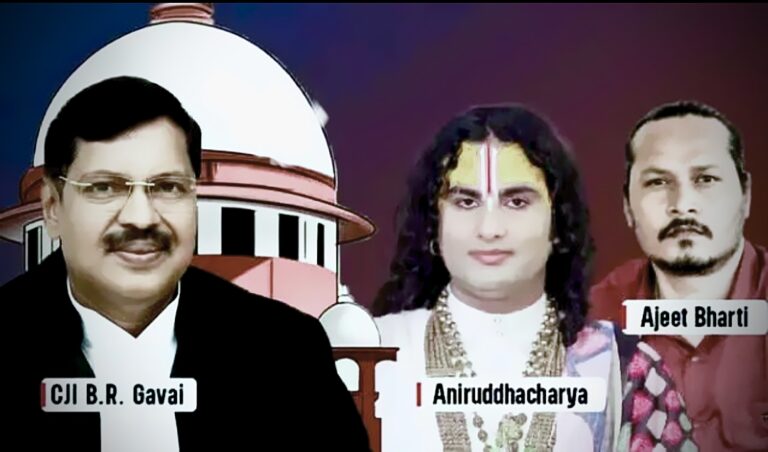Reports indicate that activist Suraj Kumar Bauddh has requested permission from the Attorney General (AG) of India to initiate criminal contempt proceedings against preacher Aniruddhacharya and YouTuber Ajeet Bharti. This request follows an incident in which a lawyer attempted to throw a shoe at Chief Justice of India (CJI) B.R. Gavai in court.
Allegations against Aniruddhacharya and Ajeet Bharti:
The letter to the AG alleges that the duo’s inflammatory remarks were a direct incitement to the attack on the CJI.
- Aniruddhacharya: In a viral video, he allegedly made threatening statements directed at the CJI, following the CJI’s reported comments in a case involving a Vishnu idol.
- Ajeet Bharti: Shortly after the attempted shoe attack, he posted remarks on social media platform ‘X’ that allegedly mocked the CJI. He also reportedly posted statements threatening judges who he claimed are “anti-Hindu”.
Contempt of Court vs. Freedom of Speech:
The pursuit of criminal contempt against the individuals raises questions about the balance between judicial authority and freedom of speech.
The legal framework
- Contempt of Court: In India, the law is defined by the Contempt of Courts Act, 1971, which allows for action against those who “scandalise or tend to scandalise, or lower or tend to lower the authority” of the court. This power is constitutionally guaranteed to the Supreme Court and High Courts. The rationale is to maintain the judiciary’s dignity and public trust, ensuring the proper administration of justice.
- Freedom of Speech: Article 19(1)(a) of the Constitution guarantees freedom of speech and expression. However, Article 19(2) allows for “reasonable restrictions” on this right, including for contempt of court. The law thus requires a careful balancing act between the two.
The debate on suppression:
The law on contempt has long been debated as a potential tool to stifle dissent and criticism of the judiciary.
The law on contempt has long been debated as a potential tool to stifle dissent and criticism of the judiciary.
- The judiciary’s view: The courts have affirmed that while fair criticism of a judgment is permissible, comments that misrepresent facts with “mala fide intentions” to vilify the judiciary are not protected by free speech.
- Counter-arguments: Critics argue that the criminal contempt law, particularly the aspect of “scandalising the court,” is vaguely defined and can be interpreted subjectively, which risks its misuse to silence critics. In 2013, the UK abolished this form of contempt, deeming it incompatible with modern freedom of speech.
Judicial accountability:
Concerns over judicial misuse of power are not new and have prompted calls for greater judicial accountability. Some critics cite the opaqueness of judicial appointments and the cumbersome process of removing judges as factors that limit accountability and erode public faith.
Concerns over judicial misuse of power are not new and have prompted calls for greater judicial accountability. Some critics cite the opaqueness of judicial appointments and the cumbersome process of removing judges as factors that limit accountability and erode public faith.
Ultimately, the legal process in this case will involve the Attorney General deciding whether to grant consent for criminal contempt proceedings. The outcome will serve as another test of India’s evolving legal landscape concerning free speech, judicial independence, and accountability.
